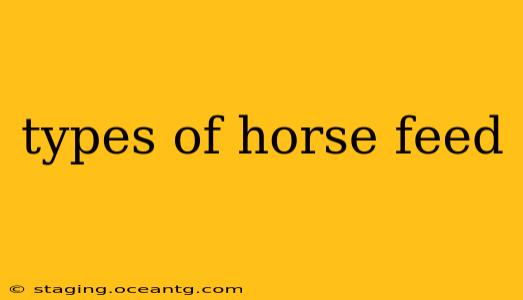Choosing the right horse feed is crucial for maintaining your equine companion's health, vitality, and performance. The market offers a vast array of options, each designed to meet specific nutritional needs depending on the horse's age, breed, workload, and overall health. Understanding the different types of horse feed is essential for responsible horse ownership. This guide will delve into the various categories and help you make informed decisions about your horse's diet.
What are the main types of horse feed?
The main categories of horse feed include:
-
Forage: This forms the cornerstone of any healthy equine diet. Forage includes grasses (hay, pasture), and legumes (alfalfa). It provides essential fiber, which is vital for digestive health and prevents colic. The type of forage chosen will depend on the horse's needs; for instance, alfalfa is higher in protein and calcium than grass hays.
-
Concentrates: These are high-energy feeds typically used to supplement forage, especially for horses with higher energy demands like performance horses or those in hard work. Concentrates come in various forms, including:
-
Grains: Oats, corn, barley, and wheat are common grains used in horse feed. They provide readily available energy. However, it's crucial to feed grains in moderation to avoid digestive issues.
-
Commercial Feeds: These are manufactured feeds that blend various ingredients, including grains, protein sources, vitamins, and minerals, to meet specific nutritional needs. They are often categorized by the horse's life stage (e.g., young horses, senior horses, pregnant mares) or workload (e.g., maintenance, performance). These come in various forms, including pellets, cubes, and textured feeds.
-
-
Supplements: These are added to a horse's diet to address specific nutritional deficiencies or support overall health. Common supplements include:
-
Vitamins and Minerals: These ensure the horse receives the necessary nutrients for optimal health.
-
Electrolytes: Important for fluid balance, especially during strenuous exercise.
-
Amino Acids: Building blocks of protein, essential for muscle growth and repair.
-
Probiotics and Prebiotics: Support gut health and digestion.
-
What are the different types of hay?
Hay is a crucial component of a horse's diet. Different types of hay offer varying nutritional profiles. Some common types include:
-
Timothy Hay: A low-protein, low-calcium hay suitable for horses prone to weight gain or those with metabolic disorders.
-
Alfalfa Hay: A high-protein, high-calcium hay ideal for growing horses, pregnant mares, and those with higher energy requirements.
-
Orchard Grass Hay: A palatable hay with moderate protein and calcium levels.
-
Grass Hay Mixes: Blends of various grasses offering a balanced nutritional profile.
What are the best types of feed for different horse breeds?
The best type of feed will vary depending on the breed, age, and workload of the horse. For instance, a large draft horse will require more forage and energy than a smaller pony. Consult with a veterinarian or equine nutritionist to determine the most suitable feed for your specific horse.
How do I choose the right horse feed for my horse?
Selecting the appropriate horse feed requires careful consideration of several factors:
-
Age: Young, growing horses need higher protein and energy than mature horses. Older horses may require feeds formulated for senior horses, addressing their slower metabolisms and potential dental issues.
-
Activity Level: Horses in heavy work will need more energy than those in light work or retirement.
-
Body Condition: Assess your horse's body condition score (BCS) to determine if weight gain or loss is needed. This will inform your feed choices.
-
Health Conditions: Certain health conditions may require specialized feeds or supplements. Always consult your veterinarian.
-
Individual Preferences: While nutrition is key, palatability can play a role in ensuring your horse consumes the necessary feed.
What are the benefits of different types of horse feed?
The benefits of different types of horse feed depend on their composition and purpose:
-
Forage: Promotes healthy digestion, prevents colic, and provides essential fiber.
-
Concentrates: Provide readily available energy for increased activity levels.
-
Supplements: Address specific nutritional deficiencies or support overall health.
Choosing the right horse feed is an investment in your horse's well-being. Remember to consult with a veterinarian or equine nutritionist for personalized advice tailored to your horse's individual needs. They can help you create a balanced and nutritious feeding plan that will keep your horse healthy and happy for years to come.
